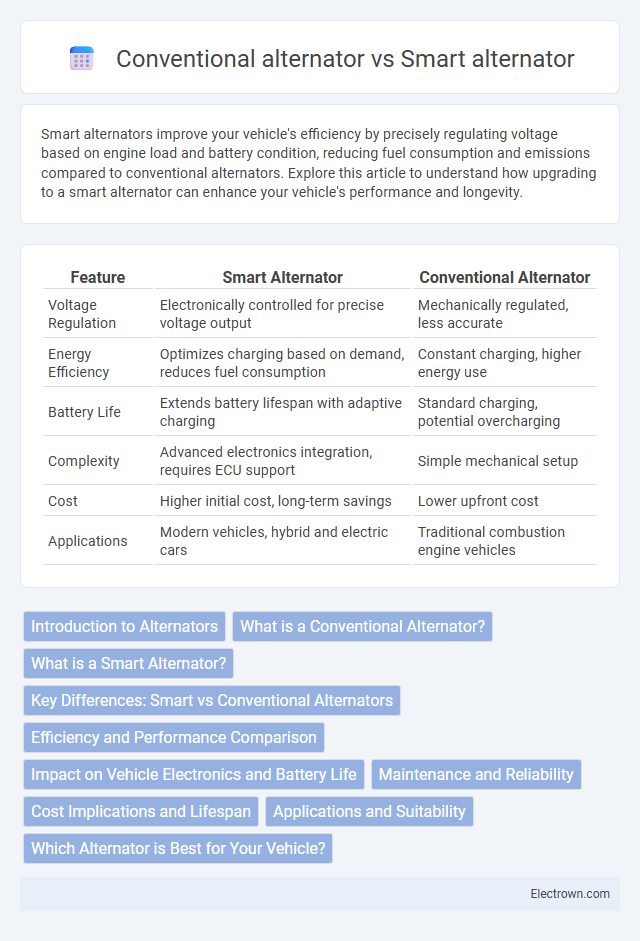Smart alternators improve your vehicle's efficiency by precisely regulating voltage based on engine load and battery condition, reducing fuel consumption and emissions compared to conventional alternators. Explore this article to understand how upgrading to a smart alternator can enhance your vehicle's performance and longevity.
Table of Comparison
| Feature | Smart Alternator | Conventional Alternator |
|---|---|---|
| Voltage Regulation | Electronically controlled for precise voltage output | Mechanically regulated, less accurate |
| Energy Efficiency | Optimizes charging based on demand, reduces fuel consumption | Constant charging, higher energy use |
| Battery Life | Extends battery lifespan with adaptive charging | Standard charging, potential overcharging |
| Complexity | Advanced electronics integration, requires ECU support | Simple mechanical setup |
| Cost | Higher initial cost, long-term savings | Lower upfront cost |
| Applications | Modern vehicles, hybrid and electric cars | Traditional combustion engine vehicles |
Introduction to Alternators
Alternators convert mechanical energy into electrical energy to power a vehicle's electrical system and recharge the battery. Smart alternators use advanced electronics to optimize charging based on driving conditions and battery status, improving fuel efficiency and battery life. Your vehicle benefits from reduced emissions and enhanced electrical management with smart alternators compared to conventional models.
What is a Conventional Alternator?
A conventional alternator is an electromechanical device used in vehicles to generate electrical power by converting mechanical energy from the engine into alternating current. It relies on a fixed voltage regulator to maintain output voltage, which can lead to inefficiencies and inconsistent power delivery under varying engine loads. Conventional alternators lack advanced control features found in smart alternators, resulting in higher fuel consumption and less optimal battery charging.
What is a Smart Alternator?
A Smart Alternator is an advanced automotive component designed to optimize electrical charging by dynamically adjusting voltage and current output based on real-time engine load and battery condition. Unlike Conventional Alternators, which provide a fixed output regardless of demand, Smart Alternators use sensors and onboard control units to improve fuel efficiency and reduce emissions. This technology enhances battery health and supports modern vehicle electrical systems by managing power more precisely.
Key Differences: Smart vs Conventional Alternators
Smart alternators optimize charging by adjusting output based on battery condition and electrical load, enhancing fuel efficiency and battery lifespan, while conventional alternators provide a constant voltage output regardless of demand. The advanced control systems in smart alternators reduce engine load and emissions by only producing needed power, contrasting with the continuous mechanical load imposed by conventional alternators. Integration with modern vehicle electronics allows smart alternators to communicate with onboard systems for adaptive charging strategies, a feature absent in traditional alternator designs.
Efficiency and Performance Comparison
Smart alternators optimize engine load by adjusting output based on real-time electrical demand, significantly improving fuel efficiency compared to conventional alternators that operate at a constant rate. They enhance battery life and vehicle performance by reducing unnecessary energy consumption and minimizing engine drag. Conventional alternators, while simpler and less expensive, often result in lower overall efficiency due to continuous, unregulated power generation.
Impact on Vehicle Electronics and Battery Life
Smart alternators regulate voltage output based on real-time vehicle electrical demands, reducing strain on electronics and improving battery charging efficiency. Conventional alternators provide a constant voltage, which can lead to overcharging, overheating, and premature battery wear, negatively impacting the lifespan of both the battery and sensitive vehicle electronics. Vehicles equipped with smart alternators experience enhanced battery longevity and more stable electrical system performance, supporting advanced electronic components and infotainment systems.
Maintenance and Reliability
Smart alternators offer enhanced reliability through advanced voltage regulation and adaptive charging, reducing the risk of battery overcharging and extending overall system lifespan. Their maintenance requirements are lower compared to conventional alternators, as they adjust output based on engine load and electrical demand, minimizing wear and overheating. Your vehicle benefits from fewer battery replacements and improved efficiency, making smart alternators a more dependable choice for modern automotive systems.
Cost Implications and Lifespan
Smart alternators typically have higher upfront costs due to advanced electronics and integrated control systems, but they offer improved fuel efficiency and extended battery life, reducing long-term expenses. Conventional alternators are less expensive initially but may lead to higher maintenance costs and shorter lifespans because of their simpler design and constant charging output. Overall, smart alternators provide better cost-effectiveness over time by optimizing energy management and minimizing wear on vehicle electrical components.
Applications and Suitability
Smart alternators excel in modern vehicles with advanced electrical systems, optimizing charge rates to improve fuel efficiency and reduce emissions, making them suitable for hybrids and stop-start engine technologies. Conventional alternators are ideal for older or simpler vehicles where steady power supply is sufficient without complex management systems. Your choice depends on vehicle type and electrical load demands, with smart alternators best suited for high-tech automotive applications.
Which Alternator is Best for Your Vehicle?
Smart alternators optimize energy management by adjusting output based on the vehicle's electrical load and battery condition, enhancing fuel efficiency and reducing emissions. Conventional alternators provide a constant output regardless of demand, which may lead to wasted energy but are generally simpler and more affordable. For modern vehicles with advanced electronics and start-stop systems, smart alternators are best, while conventional alternators suit older or basic models with less dynamic power requirements.
Smart alternator vs Conventional alternator Infographic

 electrown.com
electrown.com